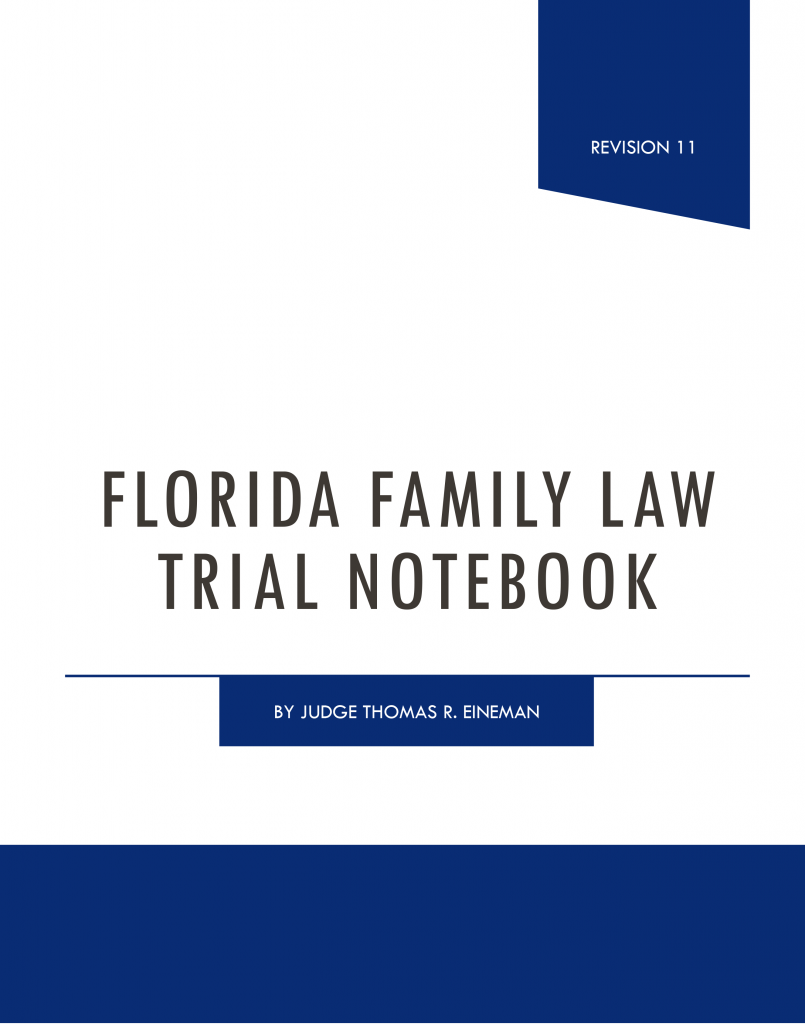Florida Family Law & Practice

ISBN: 9781945421839
Annual List Price: $269
Table of Contents
- Chapter 1: Therapeutic Jurisprudence: New Roles for Lawyer, Judge and Client
- Chapter 2: Office Management and Case Preparation
- Chapter 3: Screening and Taking the Case
- Chapter 4: Presuit Investigation and Procedures
- Chapter 5: Family Law Proceedings and Grounds
- Chapter 6: Jurisdiction and Venue
- Chapter 7: Summons, Service of Process, and E-Mail Service
- Chapter 8: Pleadings and Mandatory Electronic Filing
- Chapter 9: Emergencies and Case Management Conference
- Chapter 10: Domestic Violence
- Chapter 11: Defaults and Uncontested Hearings
- Chapter 12: Discovery and Use of Experts
- Chapter 13: Temporary Relief
- Chapter 14: Parental Responsibility
- Chapter 15: Equitable Distribution and Property Issues
- Chapter 16: Alimony and Support
- Chapter 17: Attorneys’ Fees and Costs
- Chapter 18: Alternative Dispute Resolution and Settlement
- Chapter 19: Trial and Evidence
- Chapter 20: Final Judgment; Rehearing; Motions Related to Judgment
- Chapter 21: Enforcement of Orders and Judgments
- Chapter 22: Paternity and Parenting by Unmarried Parents
Highlights of new material in this edition of Florida Family Law and Practice include:
- The Florida Supreme Court implements standalone Family Law Rules of Procedure, effective March 16, 2017. With a few exceptions, the Florida Rules of Civil Procedure no longer apply in family law cases.
- Effective July 1, 2017, the Florida Supreme Court adopts Rule Regulating the Florida Bar 4-1.9 and Florida Family Law Rule of Procedure 12.745 both addressing the Collaborative Law Process.
- A California home, transferred by a husband and wife before dissolution to a revocable trust with wife as sole trustee was not marital property subject to equitable distribution.
- The standard for reviewing a trial court’s determination of whether property was an interspousal gift subject to equitable distribution is competent, substantial evidence.
- The Fourth DCA refuses to recognize a former wife’s tort claim that her former husband’s employer engaged in fraudulent conduct after the final judgment of dissolution that falsely depressed the former husband’s income to limit his child support obligation.
- Father’s complaint against health care providers alleging battery and intentional interference with parent-child relationship was properly dismissed; health care providers may render medical care on one parent’s consent.
- District courts of appeal conflict concerning whether the results of a DNA test fulfill the requirement of “newly discovered evidence” for purposes of disestablishing paternity.
- A Florida court was required to enforce a Colorado order regarding grandparents’ visitation even though entry of a similar order by a Florida court would be prohibited by the Florida Constitution.
- The Florida Supreme Court declines to adopt the “Daubert amendment” to section 90.702, Florida Statutes, due to constitutional concerns that must be addressed in the context of a proper case or controversy.
- Wife’s pro se reply to husband’s petition for dissolution of marriage constituted both an answer and a counter-petition.
- Preparing and attaching child support guidelines to a child support agreement is no longer optional; the parties cannot waive the requirement.
- Trial court rendered a child support modification order when it filed the order with the clerk of court, not when it signed the order one week earlier, so as to trigger the 10-day period for the Department of Revenue (DOR) to file a motion to vacate the Hearing Officer’s recommended order.
- The trial court erred in awarding wife no portion of husband’s pension based on its de minimis value; over course of ten years, payout of marital portion of pension would have been roughly $21,600.
- A law firm was entitled to a charging lien against marital assets awarded to husband where the firm and husband had a written agreement providing for the lien, even though husband would have been entitled to a share of marital assets without the law firm’s representation.
- Attorneys’ fees may not be awarded against the new spouse of a former spouse.
- District courts of appeal conflict over whether the trial court has authority to award attorney’s fees pursuant to section 57.105, Florida Statutes, in a domestic violence proceeding.
- Receding from its prior opinion, the Fourth DCA granted the father attorney’s fees in a paternity action pursuant to section 742.045, Florida Statutes conditioned on a showing of need and ability to pay on remand to the trial court.
- Former wife could not be ordered to pay former husband’s fees and costs simply because she refused to settle the case.
- Bank records mandatorily disclosed under Family Law Rules of Procedure must still be admitted into evidence. Disclosed items are not per se admissible.



